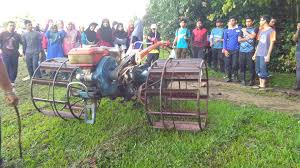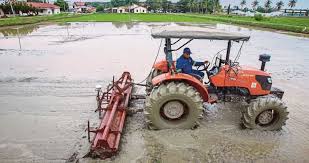Diesel Subsidies Marginalize Rice Farmers: A Call for Change
Diesel Subsidies Marginalize Rice Farmers: A Call for Change In Alor Setar, rising diesel prices are burdening rice farmers, highlighting flaws in the Budi Agri-Commodity program. With high operational costs and a complex application process, many elderly farmers struggle to benefit from these subsidies. The increase in diesel prices leads to higher costs for farming machinery, further straining farmers. This issue demands policy reform to genuinely support the rice farming community and ensure national food security.
LIFE


Understanding the Problem of Diesel Subsidy
In Alor Setar, the rise in diesel prices has caused a lot of trouble of anxiety among rice farmers, especially the current Budi agricultural program.
Instead of easing the burden on rice farmers, the program seems to sideline them by not specifying a support mechanism.
The Chief Information Officer of the Mediterranean, Mohd Ashraf Mustaqim Badrul Munir, called on the government to reconsider disbursing financial assistance through the Regional Farmers Organization (PPK), the Ministry of Agriculture and the Youth Agriculture Development Authority. (ROTTEN).
The high cost of rice cultivation
Running a rice farm is not cheap.
Farmers are very dependent on diesel, the consumption of which varies from 6,000 to 10,000 liters per season.
Despite the help offered, it barely scratches the surface of their financial problems.
Mohd Ashraf highlighted the cumbersome bureaucracy involved in applying for grants, such as submitting income tax returns to the Department of Revenue (LHDN) and registering vehicles under the Road Transport Authority (JPJ).
These processes add additional costs, making it difficult for many farmers to apply for much-needed support.
Aging Farmer Population
Most rice farmers are elderly and current practices are unfavourable to this population.
The complexity of the system creates a ripple effect that forces farmers to pay costs from planting to selling the rice.
The irony is that although subsidies are intended to help, they often benefit the capitalists of the rice ecosystem rather than the farmers themselves.
The domino effect of diesel price hikes
As the price of diesel increases, so do the operating costs of agricultural machinery such as tractors and rice harvesters.
These increased costs will inevitably be passed on to farmers who are already struggling to make ends meet.
Mohd Ashraf pointed out that the current subsidy mechanism gives room for price manipulation, which increases rice farmers.
Voices from the field
A trip to Kota Siputeh reveals the true impact of these practices.
Here, many farmers rent land and are not actual land owners.
Their sacrifices for national food security often go unnoticed, and despite their hard work, their quality of life has stagnated.
It is amazing how a key part of our national food chain, the rice farmers, is left out of diesel subsidies.
Misallocation of Grants
The current grant appeal appears misleading.
For example, Budi's monthly stipend of RM200 to individuals does not offset the high operating costs of using rice farming machinery.
This lack of balance leads to a greater financial burden on farmers, creates confusion in the rice farming ecosystem and opens up opportunities for wealthy capitalists.
Call for political reform
Mohd Ashraf, representing the voice of rice farmers in Kota Siputeh, one of Malaysia's largest rice farms, calls for political reform.
The recent increase in the price of diesel fuel from RM2.15 to RM3.35 per liter has left farmers deeply worried.
He believes that the federal government should base its policies on the realities of farmers instead of imposing bureaucratic burdens.
Bridging the Gap: Policy and Reality
As a community leader, Mohd Ashraf emphasizes the importance of good policies that really support farmers.
He pointed out that the bureaucracy is overwhelming the people in Budi registration, which is against the spirit of the general policy promoted by the government.
Quoting Prime Minister Datuk Seri Anwar Ibrahim, Mohd Ashraf calls on leaders to think about their policies and ensure that they do not add unnecessary burden to the people, especially rice farmers.
Action
The plight of rice farmers calls us all to act.
By supporting policies that truly ease their burden, we can ensure the sustainability of our national food security and improve the quality of life of those who work tirelessly to provide our one staple food.
By tackling these issues head-on and supporting a friendlier approach to subsidies, we can ensure that rice farmers are not left behind.
Let's stand behind our farmers and demand the change they deserve.
Diesel Subsidies Marginalize Rice Farmers: A Call for Change
In Alor Setar, rising diesel prices are burdening rice farmers, highlighting flaws in the Budi Agri-Commodity program. With high operational costs and a complex application process, many elderly farmers struggle to benefit from these subsidies. The increase in diesel prices leads to higher costs for farming machinery, further straining farmers. This issue demands policy reform to genuinely support the rice farming community and ensure national food security.


